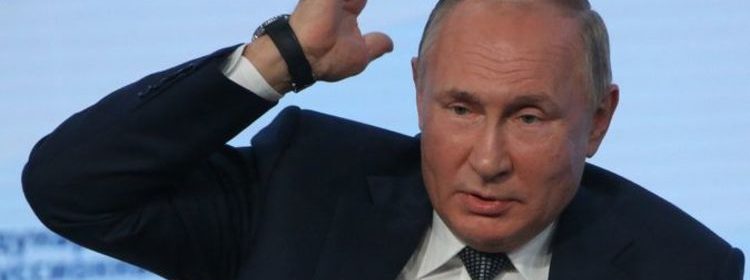‘Imminent Russia invasion’ Katya Adler issues Putin warning that is terrifying

Russia fears: Poland and Ukraine could sparker wider conflict
We use your sign-up to provide content in ways you’ve consented to and to improve our understanding of you. This may include adverts from us and 3rd parties based on our understanding. You can unsubscribe at any time. More info
The warning as the approval for Nordstream 2 – a gas pipeline that would send gas supplies directly from Russia to Germany, bypassing Ukraine – has been suspended. Ms Adler said “Moscow won’t be pleased” about the decision. Writing on Twitter, the BBC journalist said: “Outgoing Chancellor Angela Merkel was often criticised for going too easy on Russia.
“Accused of putting German economic interests before politics/diplomacy w Russia esp after Crimea.
“Ukraine was furious about the pipeline – but Germany’s Network Agency has now ruled that Ukraine must be part of Nordstream certification process.
“Yesterday Boris Johnson warned Germany it had a choice between sticking up for Ukraine – there are now fears of an imminent Russian invasion – and approving Nordstream 2.”
The controversial project, that began in April 2018, has been opposed by both Ukraine and the United States.


Critics say the 1,230-kilometre pipeline under the Baltic Sea will increase Europe’s energy dependence on Moscow.
The pipeline was suspended after Germany’s energy regulator said it could not proceed with certification of the pipeline because the company which owns it is registered in Switzerland, not Germany.
It is owned by Russian gas giant Gazprom but also has investment from some major European firms.
In a statement released on Tuesday, the regulator said: “Following a thorough examination of the documentation, the Bundesnetzagentur concluded that it would only be possible to certify an operator of the Nord Stream 2 pipeline if that operator was organised in a legal form under German law.”


The Russian project has also been delayed by US sanctions on the company that owns the pipeline, which were lifted in May.
Russia has been accused of withholding gas supplies to Europe in a bid to force approval for Nord Stream 2.
This comes amid an escalating gas crisis in Europe, with fuel prices rising to record highs.
The German regulator now has four months, until January 2022 to reach a draft decision on the pipeline’s certification.
DON’T MISS:
Camilla ‘dreading’ being in the spotlight when Charles becomes king [INSIGHT]
Major sanctions planned for Belarus as migrant war explodes [REACTION]
Meghan could still win case despite enraging critics [ANALYSIS]

Ukraine, which stands to lose about £2.2bn a year in gas transit fees, has been fighting Russian-backed separatists in the east since 2014.
The country fears a full-scale Russian invasion once Nord Stream 2 is fully operational.
Speaking to the Financial Times, Ukraine’s foreign minister, Dmytro Kuleba said: “For us, Nord Stream 2 is a security issue.
“We think that the use of migrants by Belarus, the situation around Nord Stream 2, the disinformation campaigns, the military build-up by Russia, are all part of a broader picture.

“Russia is involved in all of these situations.”
In a speech at the Guildhall on Monday, UK Prime Minister Boris Johnson outlined a choice between Russian pipelines and “sticking up for Ukraine”
He said: “When we say that we support the sovereignty and integrity of Ukraine that is not because we want to be adversarial to Russia, or that we want in some way strategically to encircle or undermine that great country.
“It is because we have a commitment to democracy and freedom that is shared now across the vast mass of the European continent.
“And when our Polish friends asked for our help to deal with a contrived crisis on their border with Belarus, we were quick to respond.
“And we hope that our friends may recognise that a choice is shortly coming between mainlining ever more Russian hydrocarbons in giant new pipelines and sticking up for Ukraine and championing the cause of peace and stability, let me put it that way.”
Source: Read Full Article
